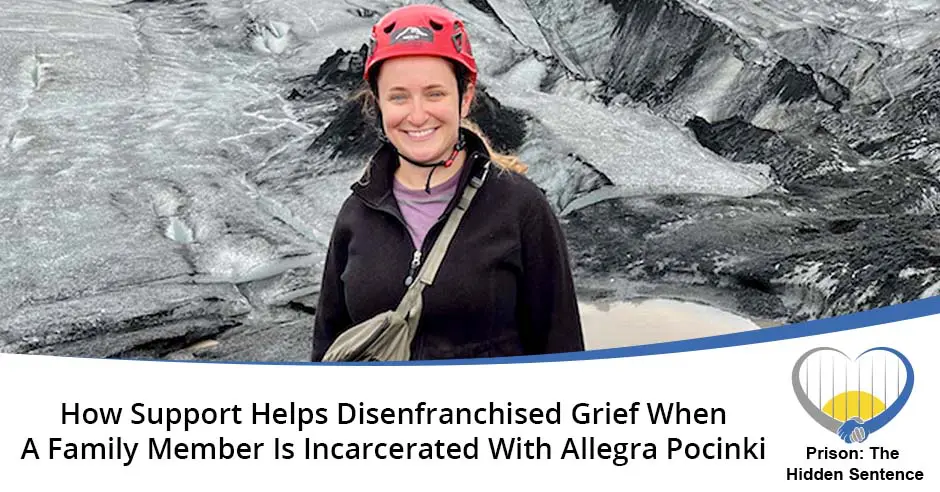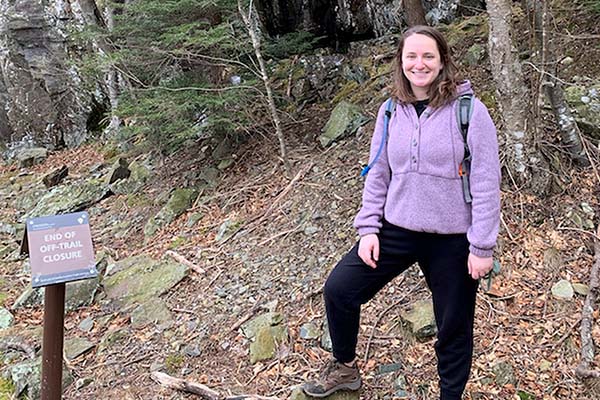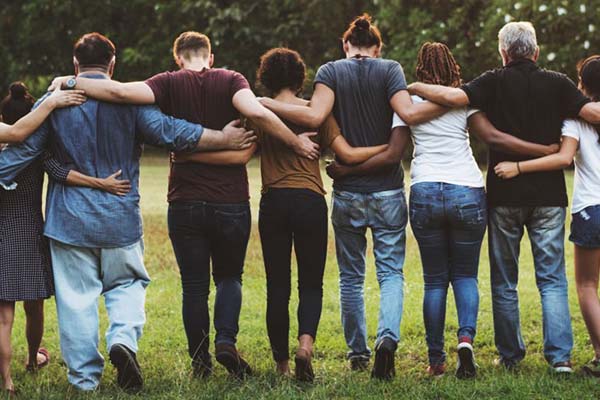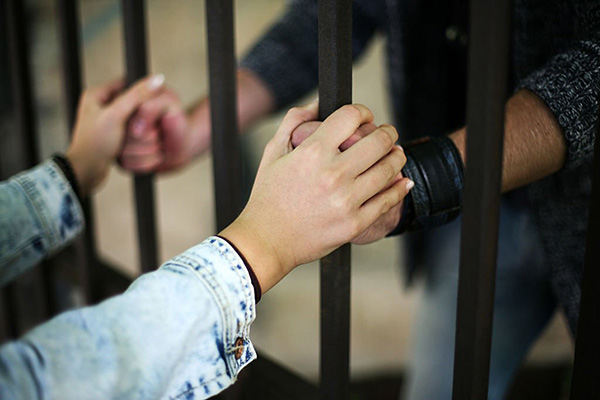
Disenfranchised Grief affects families who have incarcerated loved ones. When a family member is incarcerated, it is a loss to the family. Those outside find it difficult to openly acknowledge their feelings or seek public support. In this episode, learn the six factors contributing to disenfranchised grief and ways to alleviate the grief. Julia Lazareck interviews Allegra Pocinki, whose work focuses on racial disparities in the criminal justice system, specifically the impacts of incarceration for those “doing time on the outside.” This conversation offers support if you have a loved one in the prison system or know a family who is affected. Let Allegra show you ways to support them.
—
Listen to the podcast here
How Support Helps Disenfranchised Grief When A Family Member Is Incarcerated With Allegra Pocinki
Thank you so much for having me. It means a lot.
I am a Sociology student. A lot of my research focuses on the literature within sociology but I found this within social work. Once I was doing my research and found this term, I had this a-ha moment where I was like, “Everything I’m seeing in these support groups for families is expressing what I think of as disenfranchised grief.” It is a loss. We would think of when someone dies, you bereave them but when someone is sent to prison, it’s its own loss in a way. In this case, in particular, it’s a loss that you can’t openly acknowledge, publicly mourn or feel any social support for.
According to this literature, there are six main factors that contribute to disenfranchised grief. The first is that the loss is ignored either by yourself or by people around you. The second is that feelings and responses to that loss are ignored. The third is that no support is received in any form financially, emotionally or otherwise. Four is that there are limited opportunities to grieve. Fifth is that others condemn or question the bereavement. That leads to number six, which is that the loss is stigmatized. I saw all kinds of components of this type featured in my interviews with folks around the country who are in support groups because they have a family member incarcerated.
You see why I had this moment where I was like, “This is exactly what I have been looking for. Someone had described it well.” The reason I’m interested in this is that I’ve done a lot of research in the past on stigma, more so with regards to opioid use, but also, in general, I’m interested in the ways in which society, in particular, American society stigmatizes certain behaviors and people.
Support groups provide emotional support that your average friend can't, which is a true understanding of your experiences. Share on XWhen I think of families who have a loved one who’s incarcerated, so many of them told me, “Either my loved ones didn’t want to talk about it or they pretended that my incarcerated loved one was no longer around. They would say that I had no opportunities for grieving because I had to keep going to work the next day.” This was a great way for me to put a word to what I was seeing and hearing from other people.
The goal of this study was to find out what support groups there are in the United States for families with an incarcerated loved one. I went out there and started doing Google searches of what exists. Do these folks know each other? There are a lot of independent people around the country starting their groups from scratch. Most are reinventing the wheel because they don’t know that these other people are out there. Some of them started in the ’70s and ’80s. Some of them are brand new.
Technology has changed the way in which these support groups work, especially during COVID. A lot of them started as a couple of people meeting in a coffee shop. Now people all around the world are getting on Zoom. The thing that I found with this is very similar among people with stigmatizing health diagnoses like HIV, which is that people don’t feel comfortable sharing information unless they are around other people who have experienced that same thing.
We have found in the sociology literature there’s evidence that folks who are diagnosed with either HIV or some advanced-stage cancer find more support from strangers who have that same experience than their closest friends. There’s something to that of bringing a bunch of people who have never known each other into one room but they’re sharing stories that are similar. Once they have shared those, they have a place to share them where there is no disenfranchisement, and they are allowed to name their grief, talk about it, and say what hurts and doesn’t hurt. Other people have similar stories that they can then move forward. You are breaking down some of that stigma.
A lot of times, we think when something bad happens to us, we want to draw upon our friends, family, and support. This is one of those cases because of disenfranchised grief that it’s not that simple. Your closest friends and family may not have the capacity to understand in a way that a total stranger who has this experience does. One of the things I’ve found is that these support groups provide a type of emotional support that your average friend can’t, which is a true understanding of your experiences.

I have introduced a bunch of folks to each other with their permission but I’m working to expand that. As I share my research findings with them, which is happening soon, I’m going to say, “I’ve already connected with a bunch of folks through this work but then I found out that some other people know each other and some don’t.” One of the things that are hardest with some of these groups is that when they were started by one person having their experience with incarceration, they didn’t think twenty years down the line that this would become a full-fledged nonprofit support group.
They haven’t had too many ideas about succession plans. That was one of the things I talked with folks about it as well. We don’t want these groups to end with the one person who started them because they are serving a need in the population. I tell people all the time, “There are a little less than two million people incarcerated in the United States. If you think about 1 of each of those 2 million being attached to at least 2 or 3 other individuals, that’s 6 million people who are immediately affected by the incarceration rate. It’s probably more than that.”
The more you think about it that way, not just being the people who are physically incarcerated but all the people attached to them, that’s not impacting a small number of people. That’s why I’m trying also to make sure that these groups know about each other in case they are having issues with succession plans or want to learn how to make themselves a nonprofit or things like that. They can do that because some of these folks have acquired a massive amount of knowledge building their groups. You don’t want that to disappear.
The other thing that has been so successful about these support groups is not just emotional support but knowledge. They share information that prisons may or may not want you to have. A lot of information about incarceration is gatekept by certain people. If you are able to meet somebody who has gone through certain processes that you are about to go through and knows the inside scoop on things, that’s invaluable to getting that information firsthand. That is information that you are probably only going to get because someone has experienced it, not because someone called up and asked for information. That’s why this is also important.
Support groups are not just for the people who are physically incarcerated but all the people attached to them. Share on XA little bit. Part of the focus is so much on incarceration because there has been a decent amount of research on reentry and how family involvement helps prevent recidivism. I remember talking to someone about this project and she said, “Reentry plans should start as soon as the sentence begins.” That doesn’t happen. That’s a huge consequence that I’ve seen in my other research project on COVID in the New Jersey prisons. There were no reentry plans.
There are so many traumas that are associated with being incarcerated for a long time. When you then all of a sudden put somebody back into society, and they are not ready for it or released early all of a sudden and not prepared, that can derail reentry plans or maybe there are no reentry plans at all. I have talked to some folks who, since being released, still don’t do certain things like go to the grocery store by themselves because they don’t want to be in crowded spaces, especially now that COVID has happened.
It’s clear from what I’ve learned that nobody is talking about reentry until the sentence is over. That’s not okay. I forget what the statistic is but a huge proportion of people who are sentenced to time reenter society. It’s not less than half. More than half of people who are going to prison are coming back out into society. If we are not preparing them for that, what is the purpose? What are we doing? What are we teaching them other than learning how to exist in a congregate setting?

A lot of it is not being afraid to say things and ask for help. One of the things that I’ve heard a lot of is families who are further along in the process are giving advice, especially if it’s your child who’s incarcerated. A lot of parents feel like, “Where did I go wrong?” In one of my interviews, that was a common theme where someone who had been going to the support group for a while was the resident parent of the group who was like, “I have been here before. I know how you are feeling. This is going to go away. You can’t blame this all on yourself.”
A lot of it is being open because these groups may provide the first space ever that you can feel like you are open but at the same time, you go somewhere for the first time like this and are probably pretty nervous. A lot of folks for this one meeting that I went to were saying they don’t talk the first few times they go. They wait until the 3rd or 4th time. One of the things I would say is to keep going.
The other thing is don’t be afraid to say something. I’m a teacher. If you have a question, the chances are somebody else has the same question. If you have an issue where you are like, “I can’t figure out where my child has been transferred,” or things like that, the chances are if you are in one of these groups that somebody has been through that, whereas you are not going to get that from your coworkers.
Consistency is one of the things. One of the things I’ve seen a lot in these groups is that people go as long as they personally need the help but aren’t always paying it forward because they are overwhelmed. If your loved one reenters, then you are busy with that. There can be a lot of turnover in that sense. The people who I’ve talked to have been doing this the longest emphasized paying it forward. Somebody helped you, helped the next person, and so on.
As soon as a label is attached to you, it becomes a self-fulfilling prophecy. And you accept that as your identity, whether or not that is your whole identity, and it just compounds on itself. Share on XA lot of that information you probably couldn’t get without a plan or network of people on the ground. A lot of this information you can’t google. It has to come from someone who has been to that specific prison because there are many different rules in different places. It’s so much more valuable when it’s coming from someone who has been through it. You know that information is correct rather than going off of what you read online or what an official told you was going to happen. You get there, and that’s not what happens. It’s much better to have that from somebody who has been through it before.
Yes, I have. Some of them experienced this in the ’80s and ’90s. It was a little bit different than now. In certain states, they have video visits, and iPads that people can email through but not every state has that. One woman I spoke to said that the big issue with her partner was not necessarily their relationship so much but his relationship with their children.
She was scrambling to figure out how to allow him to maintain contact with them when they had no contact visits with children under eighteen at that time. She talked a lot about how they were married. They were partners but now that he was incarcerated, she had to focus on her children. She said, “He may have done something wrong but he’s still their father. He still needs to be their father.” She talked a lot about that.
The other big issue for some people is income, especially if you are partners. You are used to having a dual-income household, and all of a sudden, you lose that. That changes everything. That’s impacting you on the outside if you have to move. Do you decide to move to be closer to the prison? Prison could be hours away. Those were a lot of the things we talked about but most of the folks I interviewed had adult children who were incarcerated.

In some ways, I’m more interested in changing or providing a new look into the mindset of people who aren’t facing this currently but it could be because a lot of people don’t change their minds or learn how to adapt to it until it happens to them. What if we could change things before it happens to you or before it happens at all? I’m glad you mentioned families of sex offenders because I have talked to a couple of folks in that area.
That adds so much stigma to it because there is such a wide range of offenses within that. Some are very extreme, and some are not but as soon as you get labeled that, it changes where you can live and where you can work. It changes if you can have relationships with your children because it can be such a great area in terms of how you may know that someone is convicted of an offense but you have no idea of the severity of it.
I teach Labeling Theory in Criminology. As soon as that label is attached to you, it becomes a self-fulfilling prophecy. You accept that as your identity, whether or not that is your whole identity. It compounds on itself. A couple of people I talked to who have support groups for families said, “Most of the time, I pick up the phone, and a family member will tell me what the crime is.” They want to get it out there. They haven’t told anybody but as soon as they hear that I’m from a group, they will tell me exactly what it is.
Stigma can influence people to make up other stories because it feels safer that way, but in the long run, that just ends up being detrimental. Share on XEven if it’s a sex offense, they will tell me what it is because I’m the first person they have talked to who doesn’t judge them. Part of the huge problem with disenfranchised grief is, “I have a loved one in prison. They are there for this particular offense. I get labeled then as being affiliated with them even if I’ve never done anything. The stigma is attached to me. I’m never going to talk about it again.” Labels matter a lot.
Fortunately, I have seen a huge growth in kids’ groups. That was more common in my searches than for adults. There has been a huge proliferation of kids’ support groups but also a curriculum to teach young kids how to talk about these things, especially for kids in elementary school who may have seen the trauma of their parent being arrested or things like that. It’s how to talk about those things. I’ve talked to some people who have designed a county school curriculum to talk about these things in areas in which a disproportionate number of children are being affected by it.
It has to be one of those things that everybody does. It’s not like you can have a special group of kids who go off and do this activity because that would be obvious that you are narrowing your focus to certain people. It has to be one of those things that everybody participates in so that it is anonymous in a sense as to what is going on, especially if it’s going to be in a school setting.
If it’s going to be in an extracurricular setting, it makes sense if you have a support group for kids who only have incarcerated parents because you are not going to be in public with those people. You are going to be in some private meeting but in a school curriculum, it has to be one of those things that are geared towards everyone. It has to be geared towards everyone anyway because this could happen to anyone, and just because it hasn’t happened to you now doesn’t mean that’s not a possibility.

I’m glad you mentioned that because that was a point that came up multiple times. Don’t sugarcoat this and lie to your children because they will find out. Part of the advocacy work I’m doing is these kids’ books on how to talk about this with young kids in words that they understand. I had multiple people tell me that if they had tried to give another story about what happened to mommy or daddy, that wouldn’t have lasted very long anyway.
That ends up hurting the person more because you’ve lied to them and not been truthful from the beginning. That’s one of the other messages that come through. The stigma of this can influence people to make up other stories because it feels safer that way but in the long run, that ends up being pretty detrimental.
One other component about it that people don’t realize is that you can do it to yourself. You can disenfranchise your grief by internalizing social norms about what is or is not acceptable. You can tell yourself, “I can’t talk to anybody about this because it’s not a loss. It’s not like somebody died, although it does feel like that in many ways. I can’t talk about this because this will happen.” When you internalize all that messaging, then you are disenfranchising yourself. You are not allowing any of these processes to happen. It’s important to recognize that it can go both ways. You can do that to yourself but folks around you can do it as well.
Support groups have specific characteristics that generate a new way of thinking about your life situation. Share on XThere are victims on both sides. Most of the folks I’ve talked to aren’t trying to necessarily apologize for what happened. That’s not their responsibility. That’s their loved one’s responsibility. The focus is on getting them to a happy and safe place to support that person regardless of what they did.
The other thing that I didn’t bring up about this is that I talk about support groups in this case as what we would call in the literature a framing institution, which is a long way of saying that the group itself has specific characteristics that generate a new way of thinking about your life situation. It’s seeing it as a platform for growth rather than retreating into yourself. What’s also important is thinking about the ways in which support groups help you generate new language about who you are and who your loved one is in a more positive way for yourself.
The more support that families can give to each other who are on the outside while that time is being served, the better they are going to be on the other end of that for re-entry. The more work you’ve done to understand what’s going on and take care of yourself, the more you are then going to be able to help support somebody else. If you are still processing this when somebody is reentering society, then there’s no way you are going to be able to help them because you haven’t helped yourself. That’s important.
I appreciate you having me. It’s such a hard position to be in. I don’t know it as much from an incarceration standpoint but I know my family has been involved in other types of health support groups for severe terminal illnesses and how much of a help that has been in giving us language to talk about how we want to live the rest of our lives. You don’t realize what you are missing until you get it. You are like, “I wish I had this information before.” Go out there and find it because it’s there.
Thank you.
—
Important Links
- Allegra Pocinki – LinkedIn
- Prison Families Alliance
- Prison: The Hidden Sentence
- https://www.DCProjectConnect.com/publications
- https://www.DCProjectConnect.com/post/disenfranchised-grief-and-support-groups-for-families-of-incarcerated-individuals
About Allegra Pocinki
 Allegra received her B.A. from Swarthmore College in 2014, where she majored in History and Political Science. Following graduation, she worked as the senior center coordinator for the Center on Children and Families at the Brookings Institution, a public policy think tank in Washington, DC. Allegra is interested in racial disparities in the criminal justice system, more specifically the impacts of incarceration for those “doing time on the outside.” Her work seeks to examine how women form social networks – both online and in person – to mitigate the effects of the incarceration of their loved ones.
Allegra received her B.A. from Swarthmore College in 2014, where she majored in History and Political Science. Following graduation, she worked as the senior center coordinator for the Center on Children and Families at the Brookings Institution, a public policy think tank in Washington, DC. Allegra is interested in racial disparities in the criminal justice system, more specifically the impacts of incarceration for those “doing time on the outside.” Her work seeks to examine how women form social networks – both online and in person – to mitigate the effects of the incarceration of their loved ones.
Love the show? Subscribe, rate, review, and share!
Join the Prison: The Hidden Sentence Community today:

Helen says
Does anyone know of a group in Montreal that I can attend
My son is in prison
Thanks I’m advance